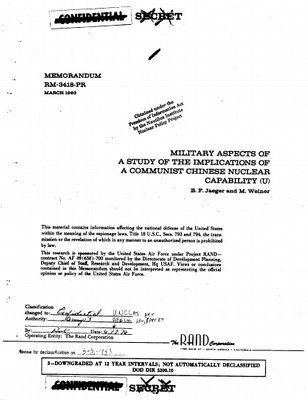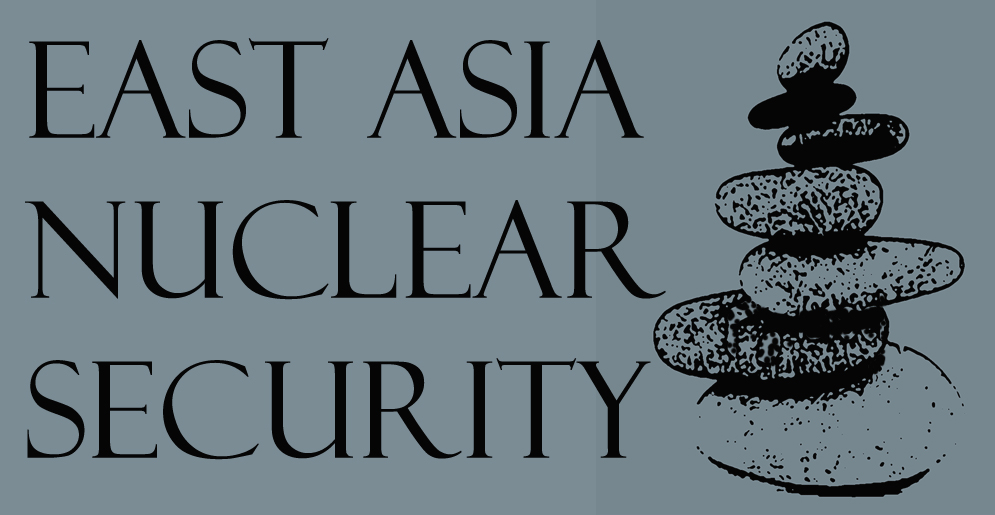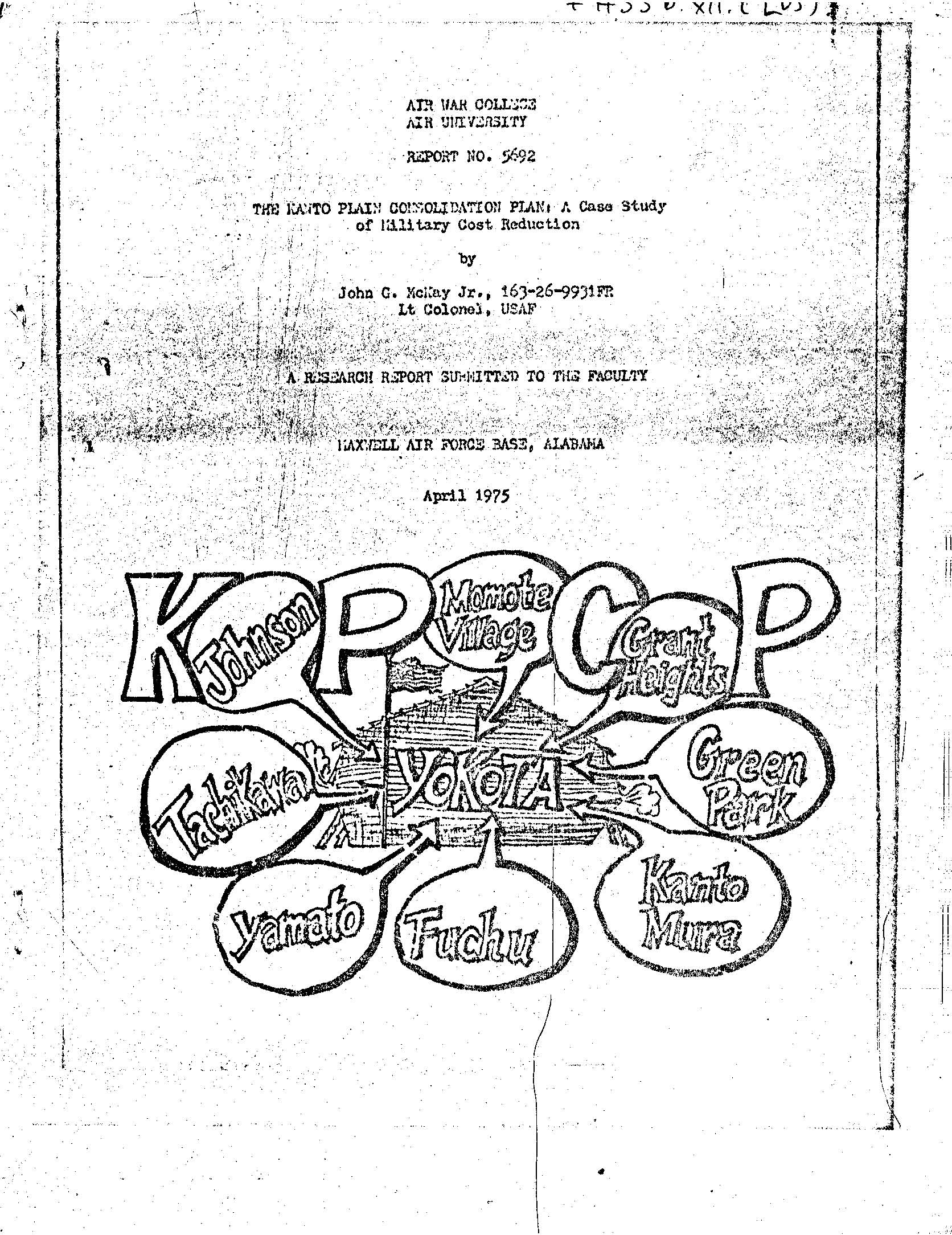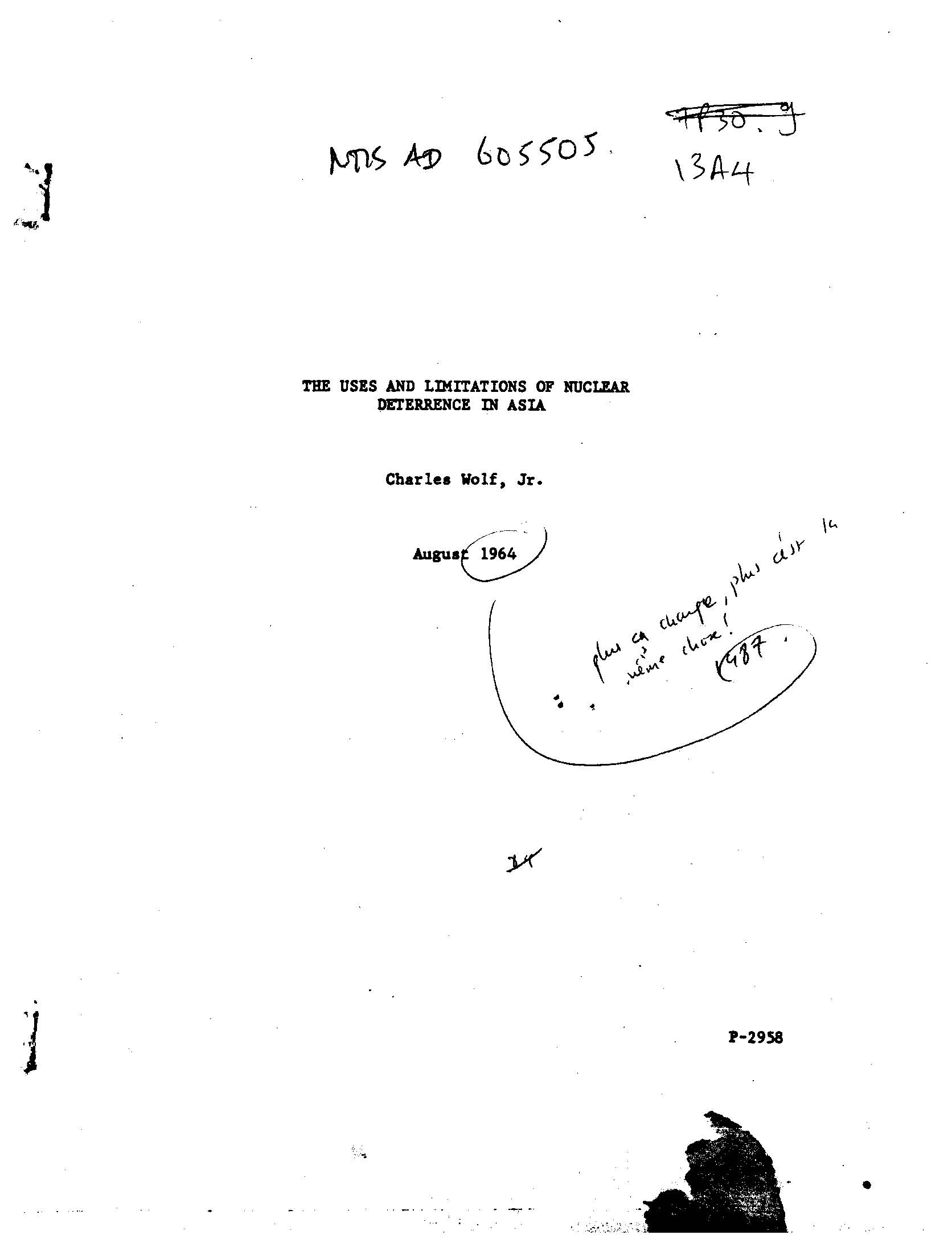Special Reports are longer, often more technical, documents consisting of entire articles, government statements, and other documents relevant to security and peace in Northeast Asia.
Military Aspects of a Study of the Implications of a Communist Chinese Nuclear Capability

In this 1963 report B.F. Jaeger and M. Weiner analyze Chinese nuclear capabilities under three different cross-strait conflict scenarios. The three scenarios provide an assessment of the possible military consequences of China’s possession of a modest nuclear arsenal, and give some indication of the magnitude of the risks China might face in a military confrontation with the United States over Taiwan.
This report was released to the Nautilus Institute under the US Freedom of Information Act (FOIA). See the Institute’s FOIA Global Disclosure Project page to read more chronologies, histories and reports released to Nautilus.
Go to the articleA Proposal for a Nuclear Weapons-Free Zone in Northeast Asia

Morton H. Halperin served four US presidents and is currently a Senior Adviser at the Open Society Foundation. Halperin notes that, as the Six-Party talks aimed at eliminating North Korea’s nuclear program remain stalled, a fresh approach incorporating the concept of a nuclear weapons-free zone in Northeast Asia should be considered as a way of ensuring peace and security in the region.
A version of this essay was originally presented at the East Asia Nuclear Security Workshop in Tokyo, Japan, on Nov. 11, 2011 convened by Nautilus Institute, Mansfield Foundation, and the Asia-Pacific Leadership Network. The workshop addressed the robustness of proposals to establish a nuclear weapons-free zone in the Northeast Asia region.
Go to the articleThe Kanto Plain Consolidation Plan: A Case Study of Military Cost Reduction

The study describes the political and economic conditions that impacted the U.S. Air Force basing posture in Tokyo, Japan in early 1970 and the plan that was developed to reduce these impacts. The main theme explains the formulation and successful implementation of this plan that was designed to preserve mission capability at reduced cost by consolidating widely scattered activities away from metropolitan Tokyo by fiscal year 1975. John G. McKay writes, “Perhaps this case study of a successful USAF plan and program will serve some useful purpose in future U.S. force posturing in that it records the methodology employed for achieving a significant cost-savings through dedicated and perserving efforts in effective resource management.”
This report was released to the Nautilus Institute under the US Freedom of Information Act (FOIA). See the Institute’s FOIA Global Disclosure Project page to read more chronologies, histories and reports released to Nautilus.
Go to the articleThe Uses and Limitations of Nuclear Deterrence in Asia

In this 1964 report Wolf explores US extended nuclear deterrence in China, Japan, and South Korea as well as the impact it could have in Asian countries then “under Communist threat”. Wolf uses two frameworks to assess the effectiveness of US conventional military and nuclear options in Asia: “broad-deterrence” and “narrow-deterrence” options. Wolf uses these two views to consider the provocation threshold, military and political pressures and alternative actions at play in each situation. Wolf writes, “In Asia, we are left with a wide range of current and potential undeterred conflicts. Although nuclear deterrence is more operative and effective than is often believed, its limitations are manifest not only in the Vietnamese and Laos cases, but in the unambiguous Indonesian confrontation with Malaysia and in the case of various forms of possible Chinese aggression against India or Burma. It is in this area of undeterred conflicts where our greatest need for improvements in programs and policies lie.”
This report was released to the Nautilus Institute under the US Freedom of Information Act (FOIA). See the Institute’s FOIA Global Disclosure Project page to read more chronologies, histories and reports released to Nautilus.
Go to the articleSouth Korea’s Plans for Tidal Power: When a “Green” Solution Creates More Problems

Yekang Ko, a Ph.D. candidate in Environmental Planning at UC Berkeley, and Derek K. Schubert, a Landscape Architect at John Northmore Roberts & Associates and President of SAVE International, respond to “Case Study of Green Economy Policies: Korea” by Sun-Jin Yun and Myungrae Cho (Nautilus Institute Special Report, September 13, 2011). Yun and Cho argue that the center of South Korea’s Green Growth clearly favors economic growth, national industrial competitiveness, and an energy portfolio emphasizing nuclear power, but puts little effort toward promoting energy democracy and justice for decentralized renewable energy systems and local communities. As a complementary study to Yun and Cho’s report, the authors introduce a fierce controversy between large-scale tidal power and the local efforts toward preserving wetlands and fisheries in Incheon, South Korea.
Go to the articleExtraterritorial Jurisdiction over Dual Use Nuclear Commodity Smuggling and International Law

Anthony J. Colangelo, Assistant Professor of Law, SMU Dedman School of Law, states that in light of United Nations Security Council Resolution 1540, the main legal obstacles to establishing extraterritorial and, ultimately, “universal” jurisdiction over dual use nuclear commodities smuggling boil down to a problem of legality. Colangelo shows that the concept of geographic legality offers a useful lens through which to examine the potential for extraterritorial jurisdiction over smuggling of dual use nuclear items. This report frames the major legal obstacles to establishing such jurisdiction, and, as a result, also reveals mechanisms for surmounting or breaking down those obstacles. Specifically, it clarifies the roles of national law, positive international law (treaties), and customary international law, along with key sovereignty and individual rights components, to establishing expansive and ultimately universal jurisdiction over dual use nuclear commodities smuggling anywhere in the world.
Go to the articleNuclear Materials and Commodities Smuggling, and International Criminal Law
Daniel H. Joyner, Professor of Law, University of Alabama School of Law, argues that nuclear materials and commodities smuggling is currently established in customary international law (CIL) as an international crime, but that that crime is limited in its effectiveness by its imprecise definition and its lack of an accompanying right of universal jurisdiction over the offense. He states that “a multilateral treaty further recognizing this crime and clarifying its criteria and scope and the universality of state jurisdiction over it, would be useful in addressing the limitations of a CIL-based crime, and would create a treaty-CIL mutually reinforcing relationship of a type seen in other substantive areas of international law”.
Go to the articleLegal Cooperation to Control Non-State Nuclear Proliferation: Extra-Territorial Jurisdiction and UN Resolutions 1540 and 1373 – Workshop Summary Report
This is the Summary Report from the Nautilus Institute workshop “Cooperation to Control Non-State Nuclear Proliferation: Extra-Territorial Jurisdiction and UN Resolutions 1540 and 1373” held on April 4th and 5th in Washington DC with the Stanley Foundation and the Carnegie Endowment for International Peace. This workshop explored the theoretical options and practical pathways to extend states’ control over non-state actor nuclear proliferation through the use of extra-territorial jurisdiction and international legal cooperation.
Other papers and presentations from the workshop are available here.
Go to the articleNorth Korea on the Cusp of Digital Transformation
In this report Alexandre Y. Mansourov, a Nautilus Institute Senior Associate, comprehensively examines information technology in North Korea. He states that “[t]he DPRK mobile communications industry has crossed the Rubicon, and the North Korean government can no longer roll it back without paying a severe political price. The most the authorities can do now is probably to manage its rapid expansion in such a way that will ensure that the interests of the political regime and state security are taken care of first…While traditionally, the State Security Department monitored most communications on a daily basis, the implication of this explosion of mobile phone use is that communication in North Korea has transitioned from a panopticon of total control to a voluntary compliance system where the government makes an example of a select group to try and force the rest of the country to stay in line.”
Go to the articleCommander in Chief U.S. Pacific Command History 1993 Vol I & II (U)
This history describes US Commander in Chief Pacific Command’s actions in discharging his assigned responsibilities and his relationships with U.S. military and other governmental agencies. It records his command decisions and policy positions [in 1993]…“a year in which our national security goals for the Asia-Pacific region gained clarity, coherence, and acceptance.”
This report was released to the Nautilus Institute under the US Freedom of Information Act (FOIA). See the Institute’s FOIA Global Disclosure Project page to read more chronologies, histories and reports released to Nautilus.
Go to the article
